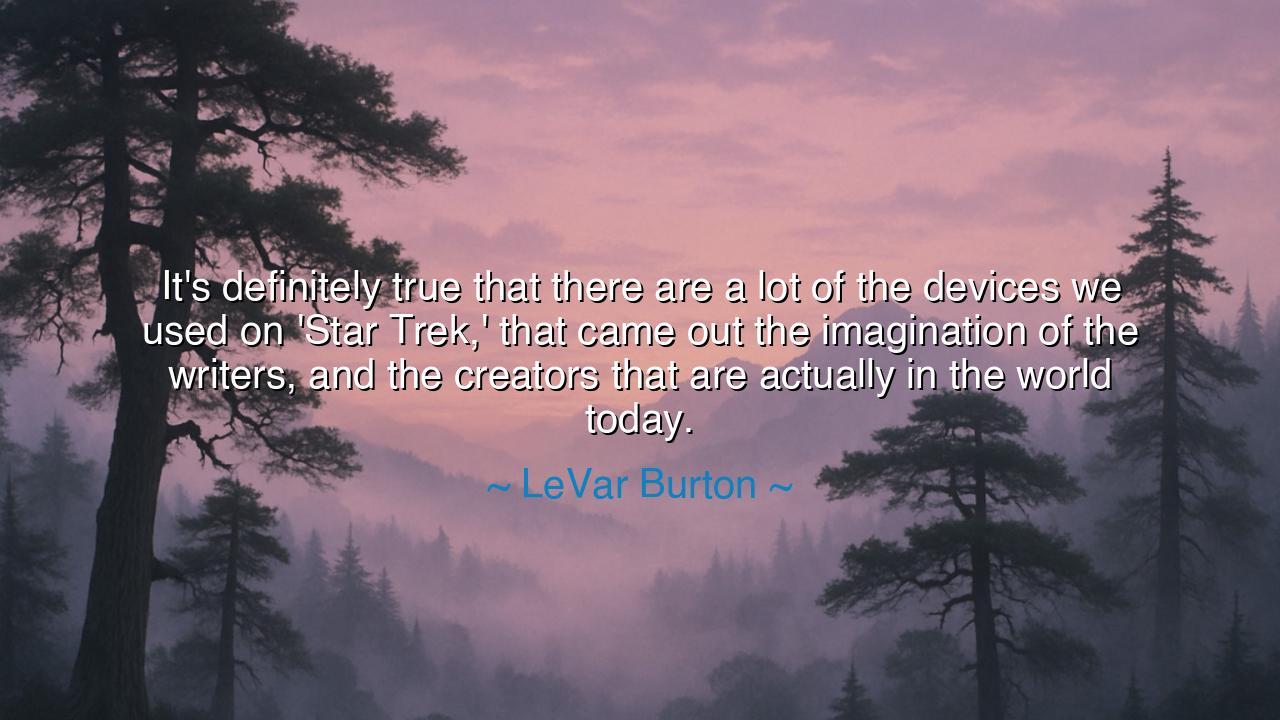
It's definitely true that there are a lot of the devices we used
It's definitely true that there are a lot of the devices we used on 'Star Trek,' that came out the imagination of the writers, and the creators that are actually in the world today.






“It’s definitely true that there are a lot of the devices we used on Star Trek, that came out of the imagination of the writers and the creators that are actually in the world today,” said LeVar Burton, the actor, teacher, and storyteller whose words remind us of the divine power of imagination. In this simple observation lies a truth older than time: that thought precedes creation, and that what the mind dares to dream, the hands will one day build. Through Star Trek, a work of speculative wonder, mankind glimpsed the tools and technologies of its own future — the fruit of imagination made real. Burton’s words are not only about science fiction, but about the alchemy of human vision, the mystery by which ideas become matter and dreams become destiny.
To understand this truth, we must first remember the age from which Star Trek was born. It was the 1960s — a time of fear and fire, of war and awakening. Humanity stood at the edge of the space age, gazing upward toward the stars with both awe and uncertainty. In that crucible of possibility, the creators of Star Trek dared to imagine a better future, a world beyond prejudice and poverty, beyond the limits of Earth. They crafted not merely a story, but a vision of what could be — a civilization where knowledge was shared, peace was pursued, and technology served the noble pursuit of exploration.
The devices that filled their universe — the communicator, the tricorder, the computer that spoke with human warmth — were born from the imagination of writers, not the laboratories of scientists. And yet, in time, they crossed from fiction into fact. The communicator became the cell phone; the ship’s computer became artificial intelligence; the tricorder found its mirror in medical scanning devices. What was once the dream of Gene Roddenberry’s writers now fills the pockets, hospitals, and homes of billions. In this way, Star Trek stands as proof that imagination is not fantasy — it is the first act of creation.
History offers many such examples. When Leonardo da Vinci drew his sketches of flying machines, centuries before the first aircraft lifted from the ground, he too was acting as a prophet of possibility. The world dismissed his designs as curiosities, yet his imagination reached beyond his time. Likewise, when Jules Verne wrote of submarines and moon voyages in the nineteenth century, he inspired scientists who would one day make those journeys real. Such visionaries, like the Star Trek creators, understood that the mind’s eye is the forge of reality — that what one generation dreams, the next will build.
LeVar Burton’s words thus remind us that the imagination is sacred. It is not child’s play nor idle fancy — it is the tool of transformation. Every invention, every work of art, every step forward in human history begins with the courage to dream beyond the visible. The writers and creators of Star Trek did not wait for permission from the world to imagine it anew; they willed the impossible into narrative form. And by doing so, they lit a path for scientists, engineers, and dreamers to follow. Their stories became blueprints for innovation, their visions the silent architects of progress.
But there is also a deeper truth hidden in Burton’s reflection: that imagination not only creates technology — it shapes character, values, and hope. The Star Trek universe dared to depict a humanity united, curious, and compassionate. It was not a fantasy of machines, but a prophecy of spirit. Through its stories, it called upon generations to believe in the potential of humankind, to envision a civilization guided by wisdom rather than greed. The same imagination that gave us communicators also gave us ideals — equality, cooperation, and courage — and these, too, must be made real in our world.
Let this, then, be the lesson: never underestimate the power of imagination. What today seems impossible may tomorrow be commonplace. The devices in our hands, the medicines that heal us, the networks that connect us — all were once only dreams. Therefore, feed your imagination, honor your curiosity, and dare to envision the unseen. Read boldly, dream widely, and create without fear. For as LeVar Burton and the creators of Star Trek have shown, the imagination is the engine of civilization, and every dreamer is, in truth, an architect of the future.
And so, my friends, remember this eternal wisdom: the future is not discovered — it is imagined first, then built by those who refuse to stop dreaming.






AAdministratorAdministrator
Welcome, honored guests. Please leave a comment, we will respond soon